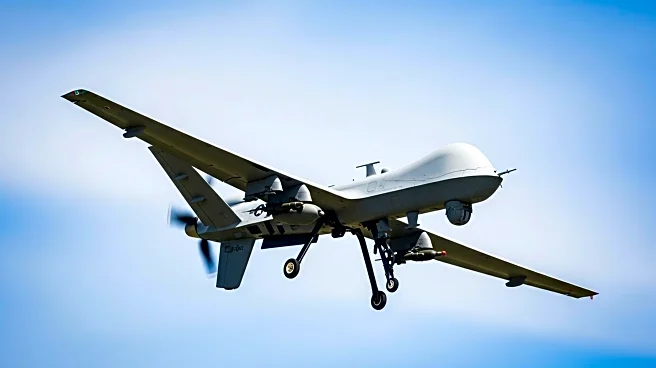What is the story about?
What's Happening?
The U.S. Air Force has reactivated the 431st Expeditionary Reconnaissance Squadron, originally a World War II fighter squadron, as an MQ-9 Reaper drone unit at Kunsan Air Base in South Korea. Under the command of Lt. Col. Douglas Slater, the squadron will operate as a tenant unit of the 8th Fighter Wing, known as 'the Wolf Pack.' The MQ-9 Reaper drones will serve as a surveillance and intelligence force, enhancing security for South Korean allies. The drones are capable of 24-hour missions and precision strikes, equipped with AGM-114 Hellfire missiles and GBU-54 Laser Joint Direct Attack Munitions. This reactivation follows the transfer of F-16 Fighting Falcon warplanes to Osan Air Base, aimed at consolidating air combat power near the North Korean border.
Why It's Important?
The reactivation of the 431st Squadron as a drone unit signifies a strategic shift in U.S. military operations in the Indo-Pacific region. By deploying MQ-9 Reaper drones, the U.S. enhances its surveillance capabilities and strengthens its commitment to regional security, particularly in response to North Korean threats. This move supports South Korean defense forces and underscores the U.S.'s dedication to maintaining stability in the region. The deployment of advanced drone technology reflects the Pentagon's initiative to rapidly acquire and field drones, aligning with broader defense strategies to address emerging threats.
What's Next?
The MQ-9 squadron will conduct surveillance missions across the Pacific and be prepared to respond rapidly to emerging threats. The activation of this unit is part of a broader U.S. strategy to bolster defense capabilities in the Indo-Pacific, potentially leading to increased military cooperation with South Korean allies. The U.S. Central Command's creation of a new task force to deliver battlefield technology at a rapid pace may further support these efforts, indicating ongoing developments in drone technology and military strategy.
Beyond the Headlines
The reactivation of the 431st Squadron highlights the evolving nature of military operations, where unmanned systems play a crucial role in intelligence and combat missions. This shift raises ethical and legal questions about the use of drones in warfare, including concerns about civilian casualties and the implications of autonomous weapon systems. The integration of advanced technology in military operations may also influence global defense policies and international relations, particularly in regions with heightened geopolitical tensions.
















